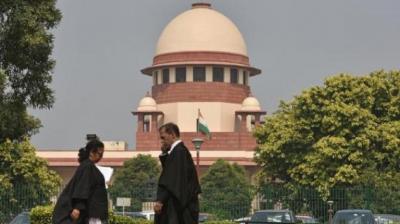Skand Tayal | Amid tensions in Korea, Opposition win in Parliament polls huge setback to Yoon
Opposition gains ground as President Yoon faces domestic discontent and foreign policy complexities
In the elections for the 300-member South Korean National Assembly on April 10, the main Opposition Democratic Party won 175 seats while the conservative bloc led by President Yoon Suk Yeol’s People Power Party won only 108 seats. This is even less than the 114 seats held by President Yoon’s supporters in the outgoing House. The results have also strengthened forces within the conservatives which are opposed to President Yoon.
Under South Korea’s Constitution, the President has only one five-year term. The National Assembly’s term is four years. President Yoon was elected in March 2022 with 48.56 per cent of the vote against the Democratic Party rival who received 47.83 per cent. In the face of rising youth unemployment, unaffordable rents and the high cost of higher education, the popular mood is against President Yoon, whose approval ratings have hovered at 36-38 per cent. The Yoon government’s plan to increase medical school seats was stoutly opposed by the entire doctor fraternity, and led to chaos in medical services in hospitals.
After assuming office in May 2022, President Yoon Suk Yeol adopted a strongly pro-American foreign policy. He is a former prosecutor with little foreign policy experience. He also reversed the pro-North Korea policies of his left-of-centre Democratic Party predecessor, President Moon Jae-in.
The most dramatic foreign policy shift by President Yoon was to make earnest efforts to promote strategic trust with Japan and in tempering the ever-simmering anti-Japan sentiments among South Korea’s public. Nudged by the United States, Prime Minister Fumio Kishida responded positively. This new-found confidence between the current leaderships of South Korea and Japan led to the historic trilateral summit of the US, Japan and South Korea hosted by President Joe Biden at Camp David in August 2023. The “Spirit of Camp David” document could be a game-changer for future strategic equations in the Indo-Pacific.
The “Spirit of Camp David” brings together two key US defence allies and bind the three democracies to greater military and security cooperation. The document voices “concern over China’s dangerous and aggressive behaviour” in the South China Sea and calls for a “peaceful resolution of the cross-Taiwan Straits issues”. It also expands the area of security cooperation between the three allies from Northeast Asia to the South China Sea and “across the Indo-Pacific and beyond”.
In the Ukraine-Russia conflict, the two Koreas are firmly in opposite camps. North Korea has been sending artillery shells to Russia with reportedly a contract to supply one million shells worth $24 billion to Russia. On the other hand, South Korea’s President is openly backing Ukraine and had attended the two Nato summits held after the Russian attack on Ukraine -- in Madrid in 2022 and Vilnius in 2023.This is the first time ever that a South Korean President attended Nato summits.
Stung by the continued economic sanctions, North Korea has adopted a very hardline stance towards both South Korea and the US. Speaking at the North Korean Supreme Peoples’ Assembly on January 15, 2024, Chairman Kim Jong Un called for change in North Korea’s Constitution to designate South Korea as a “primary foe and invariable principal enemy”.
North Korea’s supreme leader also declared the goal of “completely occupying, subjugating and reclaiming” South Korea in case a war broke out on the Korean peninsula. Signalling a complete turnaround from the policy of accommodation and rapprochement between the two Koreas pursued during 2018-19, Chairman Kim declared that seeing Seoul as a partner of reconciliation was “a serious anachronistic mistake”. Formally ending the policy of widening bilateral cooperation, North Korea dismantled three agencies: Committee for the Peaceful Reunification of the Country, National Economic Cooperation Bureau and Kumgausan International Tourism Administration.
North Korea is more confident and aggressive after Chairman Kim’s visit to the Russian Far East in September 2023 when he met President Vladimir Putin and toured a Russian cosmodrome. Later, in November 2023, North Korea successfully placed a spy satellite, Mallingyong-1, in orbit after several failed attempts. Ominously, a North Korean statement in February 2024 claimed that this satellite had captured detailed images of the White House, the Pentagon and several US aircraft-carriers.
South Korea’s polity is almost evenly divided between left-of-centre Democratic Party, which advocates an even-handed approach towards the United States, the nation’s security guarantor, and its main economic partner, China; and the ruling Conservatives, who pursue a more pronounced pro-US policy. The other difference is that of a rather accommodating approach towards North Korea by the Democrats versus a policy of strict reciprocity followed by the Conservatives.
South Korea’s attempts to reduce its dependence on exports to China from the present 20 per cent of total exports of $632 billion are not showing the expected results. While South Korean exports to China declined by 20 per cent in 2023 to $125 billion, imports from China declined by only eight per cent to $143 billion. The trade deficit of $18 billion in 2023 is the first such bilateral shortfall with China in 31 years.
With lack of control over the National Assembly now, President Yoon’s legislative agenda will suffer. During his almost two-year term, only about 29 per cent of the bills submitted by the government have been approved by the National Assembly.
During the election campaign, the Democratic Party proposed a more balanced approach on Ukraine and Taiwan. Despite this setback, Mr Yoon is unlikely to change his strongly pro-US foreign policy. Taking a clear pro-Israel position, the Yoon administration “strongly” condemned Iran’s massive attack on Israel on April 13. No positive movement is likely in inter-Korean relations in the remainder of President Yoon’s term, till May 2027.
There is strong bipartisan support for strengthening South Korea’s “special strategic partnership” with India. The National Assembly poll results are unlikely to have any impact on the growing economic and strategic bilateral relationship.



















